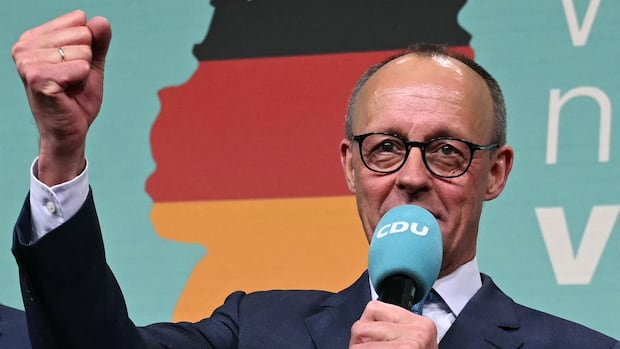Friedrich Merz, set to become Germany’s next chancellor after his opposition conservatives won the national election on Sunday, vowed to help give Europe “real independence” from the U.S. as he prepared to cobble together a government.
Merz, 69, faces complex and lengthy coalition negotiations after the far-right Alternative for Germany (AfD) surged to a historic second place in a fractured vote after the collapse of Chancellor Olaf Scholz’s unloved three-way alliance.
Mainstream parties rule out working with the AfD, which enjoyed the endorsement of prominent U.S. figures including Elon Musk, the tech billionaire and ally of U.S. President Donald Trump.
Merz, who has no previous experience in office, is set to become chancellor with Europe’s largest economy ailing, its society split over migration and its security caught between a confrontational U.S. and an assertive Russia and China.
Merz took aim at the U.S. in blunt remarks after his victory, criticizing the “ultimately outrageous” comments flowing from Washington during the campaign, comparing them to hostile interventions from Russia.
“So we are under such massive pressure from two sides that my absolute priority now is to achieve unity in Europe. It is possible to create unity in Europe,” he told a roundtable with other leaders.
Merz’s broadside against the U.S. came despite Trump welcoming the election outcome.
“Much like the USA, the people of Germany got tired of the no common sense agenda, especially on energy and immigration, that has prevailed for so many years,” Trump wrote on Truth Social.
Hitherto seen as an Atlanticist — favouring a close relationship between Europe and North America — Merz said Trump had shown his administration to be “largely indifferent to the fate of Europe.”
Coalition talks
Merz is heading into coalition talks without a strong negotiating hand. While his Christian Democratic Union/Christian Social Union emerged as the largest bloc, it scored its second worst post-war result.
It remains uncertain whether Merz will need one or two partners to form a majority, with the fate of smaller parties unclear in a way that could jumble parliamentary arithmetic. Another three-way coalition would likely be much more unwieldy, hampering Germany’s ability to show clear leadership.
The AfD, which looks set to double its score from the previous vote, saw Sunday’s result as only a beginning.
Alternative for Germany (AfD) is on course to become the second-largest player in the country’s parliament after Sunday’s election. CBC’s Margaret Evans breaks down where the far-right political party came from and why Elon Musk is getting involved.
“Our hand remains outstretched to form a government,” AfD Leader Alice Weidel told supporters, adding “next time we’ll come first.”
Chancellor Scholz’s Social Democrats (SPD) tumbled to third — their worst result since the Second World War — with Scholz conceding a “bitter” result.
Voter turnout at 83 per cent was the highest since before reunification in 1990, according to exit polls. Male voters tended more toward the right, while female voters showed stronger support for leftist parties.
Uncertain near future
A brash economic liberal who has shifted the conservatives to the right, Merz is considered the antithesis of former conservative chancellor Angela Merkel, who led Germany for 16 years.
Merz conditionally supports equipping Ukraine with longer-range Taurus missiles, a step Scholz’s government shied away from, and sees Europe as firmly anchored in NATO.

Sunday’s election came after the collapse last November of Scholz’s coalition of his SPD, the Greens and pro-market FDP in a row over budget spending.
Lengthy coalition talks could leave Scholz in a caretaker role for months, delaying urgently needed policies to revive the German economy after two consecutive years of contraction and as companies struggle against global rivals.
A delay would also create a leadership vacuum in the heart of Europe even as it deals with a host of challenges such as Trump threatening a trade war and attempting to fast-track a ceasefire deal for Ukraine without European involvement.


